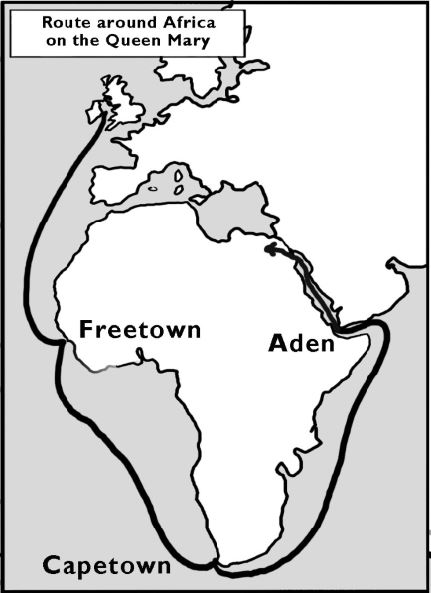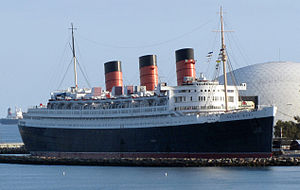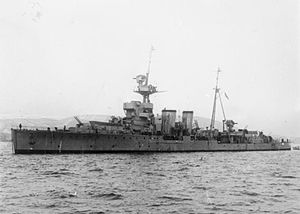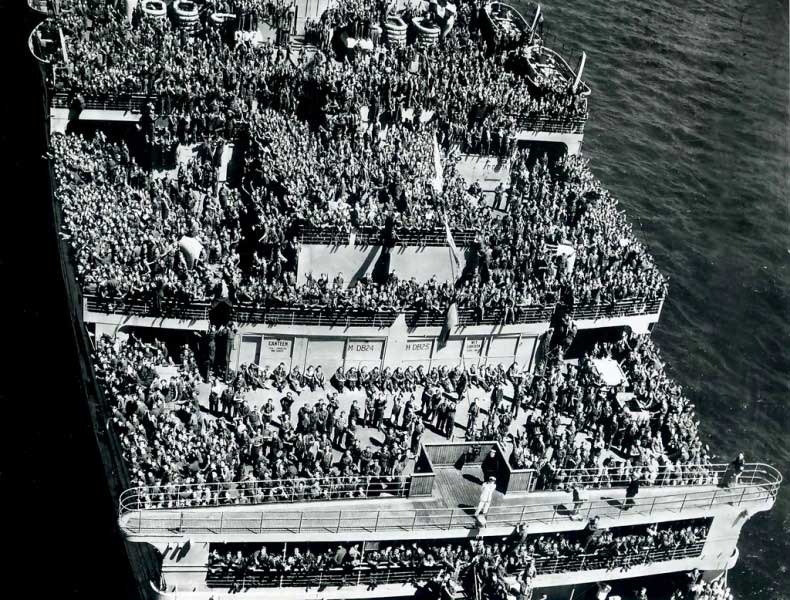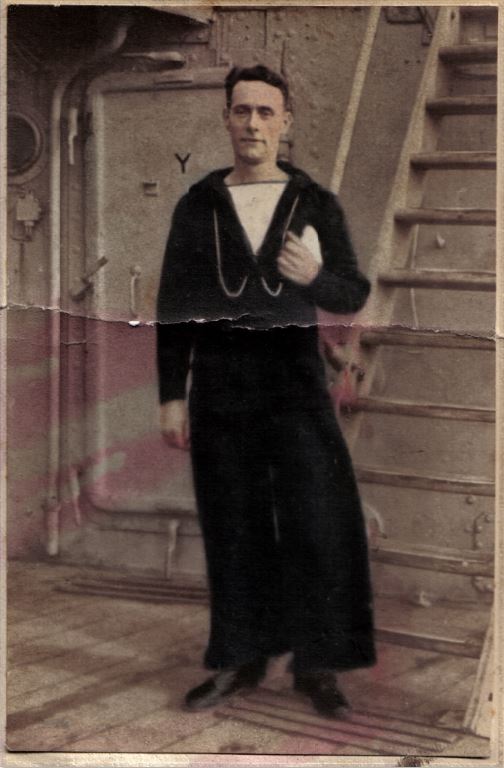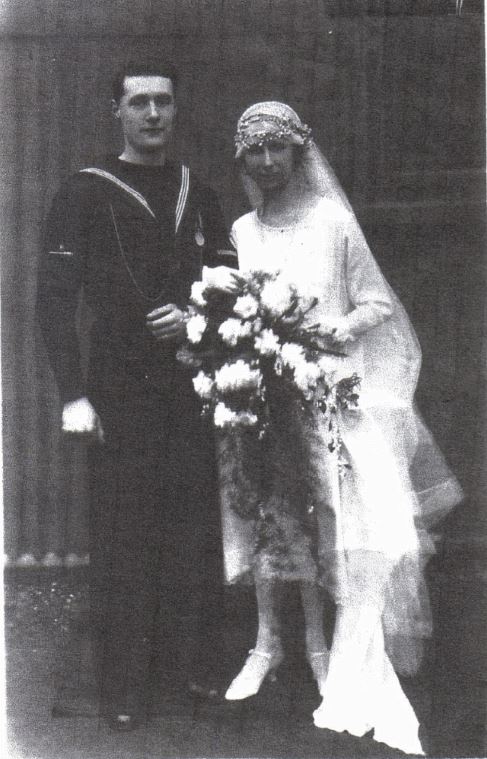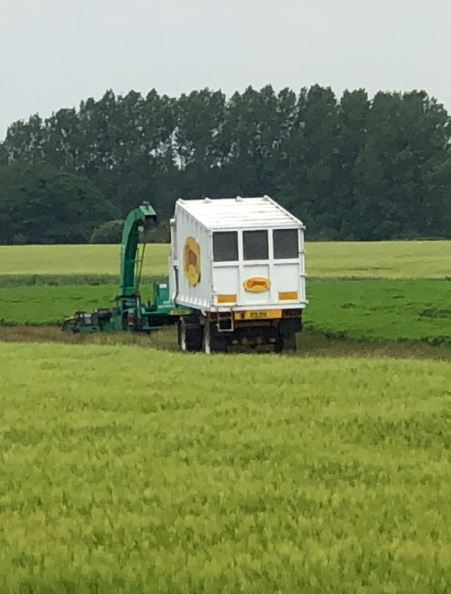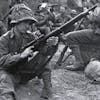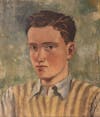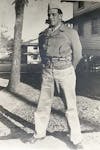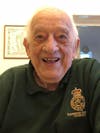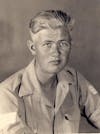30 Queen Mary in WW2

Two WW2 servicemen. Two accounts of the same very special voyage in 1943
Above: The QM entering New York harbour
Two WW2 servicemen. Two accounts of the same very special voyage upon the iconic Queen Mary in 1943, taking allied troops from Scotland to Egypt.
"I relieved Tommy as lookout on the quarter deck, he reported Queen Mary sighted with HMS Curacao in the fare of her. What happened in the next few moments was too quick to be true, unfortunately it was true.
"For three days, I didn’t care whether I lived or died; that’s how bad it was. I would never forget Christmas 1942
"The escort for the American trip was organised like a relay race, with six destroyers positioned in pairs across the Atlantic.
Best podcast for World War 2 history and the second world war
Link to feedback/reviews at Apple Podcasts - Thank you.
Queen Mary - WW2 and WWII podcast links
Wikipedia - https://en.wikipedia.org/wiki/RMS_Queen_Mary
A great web site with many historical photos - including the engine room!
Interested in Bill Cheall's book? Link here for more information.
Fighting Through from Dunkirk to Hamburg, hardback, paperback and Kindle etc.
Bill Cheall's route around Africa in the Second World War
RMS Queen Mary in Long Beach, California Jan 2011
HMS Curacao sunk by Queen Mary in 1942 wwii
Queen Mary carrying troops in WW2 WWII
Leading seaman Albert Beale left c1923 and right marriage to Hilda. Sadly Albert was to die on board HMS Curacao when it was hit by the Queen Mary
"My grandfather was a leading seaman in the Royal Fleet Reserve which he joined at the end of WW1. I have attached the only photos I have of him. He was a from a family of 15 brothers and sisters. His wife, my grandmother was very special to me. She came to live with us in Australia when I was about 9yrs old. She loved him so much that she never remarried. Consequently she didn't speak about him much as it was too upsetting". Rob Callaghan
Colman's Mint harvest 2018
Fighting Through Episode 30 - The Queen Mary at War WW2
More great unpublished history!
"12.00 noon. I relieved Tommy as lookout on the quarter deck, he reported Queen Mary sighted with HMS Curacao in the fare of her. What happened in the next few moments was too quick to be true, unfortunately it was true.
"For three days, I didn’t care whether I lived or died; that’s how bad it was. I would never forget Christmas 1942
"The escort for the American trip was organised like a relay race, with six destroyers positioned in pairs across the Atlantic.
"Whilst I wash my clothes I hear the ship’s guns open up, a chap dashes in & says put on your lifebelt. I watch from the porthole …
Before I start, a quick quiz which famous wartime personality went by the alias of Colonel Warden? Keep listening to find out!
….
Hello I’m Paul Cheall, son of Bill Cheall whose WW2 memoirs have been published by Pen and Sword – in FTFDTH.
The aim of these podcasts is to give you the stories behind the story. You’ll hear memoirs and memories of veterans connected to Dad’s war in some way – and much more.
This episode is about the ship the Queen Mary, which, during WW2 was used as a troop transport ship and, as you’re going to find out, what a beauty she was (but also what a brute, in a way). Americans, Brits and allies alike were transported on her at various times and part of this episode includes passages from Dad’s book because he had a very memorable voyage on her, a journey that people today would pay a small fortune for.
I’ve also got several more stories to share with you about the Queen Mary but first a tiny bit of background about her.
Wiki: In March 1940 Queen Mary and Normandie were joined in New York by Queen Mary's new sister ship Queen Elizabeth, fresh from her secret dash from the Clydebank shipyards in Scotland.
The three largest liners in the world sat idle for some time until the Allied commanders decided that all three ships could be used as troopships. Normandie was destroyed by fire during her troopship conversion.
Queen Mary left New York for Sydney, Australia, where she, along with several other liners, was converted into a troopship to carry Australian and New Zealand soldiers to the United Kingdom.
In the Second World War conversion, the ship was painted navy grey. As a result of her new colour, and in combination with her great speed, she became known as the "Grey Ghost."
Six miles of carpet, 220 cases of china, crystal and silver service, tapestries and paintings were removed and stored in warehouses for the duration of the war.
Queen Mary and Queen Elizabeth were the largest and fastest troopships involved in the war, often carrying as many as 15,000 men in a single voyage, and often travelling out of convoy and without escort.
Straight into the story telling
I’m about to use several memoirs posted on the WW2 People's War website which is an online archive of wartime memories contributed by members of the public and gathered by the BBC. And if you’re looking for a great history website with more great unpublished history, look no further. It’s crammed with memoirs and memories posted by members of the public about wartime happenings. There’s a link in the shownotes.
Here’s my first story :
The Sinking of WW2 HMS Curacao by the Queen Mary - 1
It’s about a ship called HMS Curacao and the devastating collision which took place with the QM. The QM was returning to Glasgow from New York and she was sometimes escorted by other ships, especially upon her return to land … I’ve got two eye-witness accounts from sailors on hand …
The incident happens just off the Irish coast.
Written by a sailor on board a nearby ship
Able Seaman on watch Enoch Foster
THE SINKING WW2 WWII podcast
Enoch Foster
[I was] drafted to HMS BRAMHAM May 1942-- March 1943
I arrived in Scotland Thursday June 5 1942 - My ship was a new one - she was lying in the River Clyde her name was HMS BRAMHAM hunt class destroyer,
A pretty looking ship but that was all, she was not built for as many hands as she had so several of the boys had to sleep on the mess tables and lockers. We provisioned and ammunitioned the ship for the first two days and made ourselves acquainted with the guns and different parts of the ship. It was on the 8 June 1942 that we sailed down the Clyde to do 3 months of trials. Ship and guns were given all they could take and still she kept going.
The first job we did was to take the King and Queen from Scotland to Belfast with the HMS BICHESTER our sister ship, also the HMS PHEOBIE also a new commissioned ship - a Cruiser. We had several escorts both ways and the trip was a quiet one. When the ship arrived back in Scotland we had a short boiler clean.
The Navy had their job to do and it was up to every man to do his best to achieve victory for England and home. For a while our ship was ordered to the Bay of Biscay to patrol against the u boats which at that time were playing havoc with our convoys,
For days we would see nothing - only the sea - sometimes smooth which to us on board was a bad omen, we needed to be on the alert more so when the sea was running calm.
It was whilst we were doing a spell of Biscay patrolling that we were introduced to the first radio controlled guided missile operated by German aircraft. We named it “chase me Charlie” the aircraft released this weapon from a good height, approx 3—5 miles from our position, well out of range of our guns,
From his plane the pilot could guide this weapon almost anywhere - no matter how much we zig jagged that missile would be following. Our first experience cost us two destroyers and a damaged Cruiser.
On one occasion we had a Charlie after us, our skipper ordered all guns to fire a blind barrage as it approached us. The blast and concussion of the shells had the effect of putting the sensitive radio machinery out of order, so we fortunately arrived back in pot (Plymouth)
and so within 48 hours to Northern Ireland, up the river Foyle for a boiler clean and provision the ship in readiness for our new assignment escorting convoys in the North Sea into home Ports.
It was on one of these missions that I had one of my worst and most unforgettable experiences. We were on patrol and well on our way to contact and escort the Queen Mary into safe waters. She was bringing a shipload of yanks to England.
Everything was going well in the forenoon; the sea was ideal, with a fair roll.
Overhead a low misty cloud, grand conditions to feel safe from subs and enemy planes. It gave us boys not on duty an opportunity to write letters home and make and mend, or tidy up the mess deck.
11.00AM up spirits, have dinner.
11.30AM get ready to relieve red watch at our appointed duties and lookout stations.
12.00 noon I relieved Tommy as lookout on the quarter deck, he reported Queen Mary sighted with HMS Curacao in the fare of her. What happened in the next few moments was too quick to be true, unfortunately it was true.
I glanced and saw QM and Curacao - they seemed ok from our position, Tommy and I put a cigarette in our mouths, I lit a match gave him a light, lighted my own, and looked astern.
Queen Mary going strong at approx 20 knots. “Curacao” I could see no sign, I immediately contacted the bridge and reported “Curacao” had disappeared, from then on it was panic, our ship turned about, Aldis lamps flashing messages.
We passed the Queen Mary - she was still making for homeport like a bad horse, we arrived at the last position where I had seen “Curacao” what a terrible sight it was, the sea was covered in oil, dirty and black with hundreds of heads with oily faces and panicky white eyes, mouths opening and closing like fish,
some shouting for their mothers and help, others just chocking with fuel oil in their lungs and dying from drowning
all good British lads, bobbing up and down. We picked as many as we could 97 out of 650
the rest - perished.
On our way back to Ireland 5 out of the 97 we had saved from the sea died on board due to the fuel in their guts, all that destruction in the time it takes to light a cigarette.
After that incident it took me a while to settle - it played on my mind and for nights sleep was hopeless. It all happened during the watch changes, the “Curacao” had been doing a zig jag course in the fare of Q.M: and naturally losing her distance and it was during one of her sweeps across the bows of Q.M that she was cut in two halves. The Q.M: went through her like a knife through butter,
To this day I wonder what the bridge personnel and lookouts of both ships were doing not to notice the nearness of each other.
Press Article
In 1942 while approaching the Clyde the QM was being met by HMS Curacao, as had happened many times before.
However someone made an error of judgement
A lookout on HMS Curacao had reported a suspected u boat sighting
HMS Curacao went across the Queen Mary's bows (in chase of the submarine), and was hit amid ships by the queen mary and was sliced in two, the two sections ending up 100 yards apart.
338 men died in the accident and 108 were later picked up from the water by destroyers.
The queen mary did not stop, as were her orders
(she had 15,000 American troops onboard bound for the UK ). Such was the impact the Queen Mary's bow plates were folded over for about 40 feet back into the vessel.
A few months later, 700 miles off Scotland, she was hit by a freak wave, which rolled her over onto her side, she eventually righted herself, but it was estimated that had she gone over another 5 inches or 3 degrees, she would not have come back, and would most certainly have sunk.
At the time she was fully loaded with US troops.
HMS Curacao Tragedy – 2 - WW2 WWII
Contributed by Brighton CSV Media Clubhouse
People in story: Alfred Johnson
Location of story: The North Atlantic (200 miles from Glasgow)
It was 1942 and I was 22 years old and a Seaman in the Merchant Navy on the Queen Mary. We were returning to Glasgow from New York, which was a four/five day journey.
The Queen Mary was carrying about 15,000 American Troops to join the Allied Forces. She was known as a 'hornets nest' in the war as there were lots of nationalities on the ship.
There were 2 of us on the poop deck on the aft of the ship and we were manning the 6 inch gun – in case we came under attack. What good we could have done with one gun, I've no idea!
A cruiser called HMS Curacao met us 200 miles off the coast of Ireland to escort us into Greenock in Scotland. I could see her clearly as I was on the aft.
We could see our escort zig-zagging in front of us - it was common for the ships and cruisers to zig-zag to confuse the U-boats. In this particular case however the escort was very, very close to us.
I said to my mate "You know she's zig-zagging all over the place in front of us, I'm sure we're going to hit her."
And sure enough, the Queen Mary sliced the cruiser in two like a piece of butter, straight through the six inch armoured plating. The Queen Mary just carried on going (we were doing about 25 knots). It was the policy not to stop and pick up survivors even if they were waving at you. It was too dangerous as the threat of U-Boats was always present.
My mate and I wanted to do something, so after the collision I said to my mate ' C'mon let's sling this over' and we released a cork life raft into the sea.
Whether anyone from the Cruiser managed to climb aboard the raft I've no idea.
The Queen Mary continued her journey to Greenock, dropped anchor and discharged the American soldiers. In her wake a tragedy was unfolding behind her in the Atlantic.
The case went to court many years later in 1949, and the Queen Mary was exonerated of blame and the whole event was forgotten.
I wonder what they told the families of those men on the cruiser?
The loss was not publicly reported until after the war ended, although the Admiralty filed a writ against Queen Mary's owners, and eventually the House of Lords assigned two-thirds of the blame to the Admiralty and one third to Cunard White Star.
So, listener, I think all that makes an interesting backdrop to the rest of this WW2 podcast episode. What a tough brute that Queen Mary must have been to survive that collision, and it fascinates me that given the damage that occurred to the Queen Mary’s hull that October, it’s highly likely that the next voyage out was the one in December 1942 when she carried my Dad on his epic cruise to the Middle east! Spooky or what?! But they do say the QM is haunted in modern times.
Over to Dad’s memoir
Before I start I want to share with you a short but sort of poignant experience I had which reminded me of Dad’s story.
I live in Norfolk, England, in the countryside. I cycle as often as I can to keep fit and just last week, end of May, I took to the tarmac for an early morning sprint. It was a beautiful dry day, sun not long up with signs of an unblemished blue sky up above. It was a fresh, cool temperature, though not cold. Just perfect for cycling really.
Pheasant – startled me
Jack Rabbit – scared the heck out of me
Later in the ride …
There’s a photo of the harvester in the shownotes
Who now fancies eating British lamb and mint sauce this weekend! Yum.
Anyway, all this early morning experience brought to mind Dad’s journey on the Queen Mary in WW2 – because he too experienced many memorable moments during regular early morning jaunts, although I don’t think he came across any jack rabbits!.
This is an abridged passage from Bill Cheall’s memoir – Fighting Through from …
It’s the end of 1942 and Dad has returned from Dunkirk and has been cooling his heels in England for over two years.
He’s been at the Green Howards HQ in Richmond, Yorkshire in the past and more recently has spent several months on guard duties at Mareham-le-Fen, in Lincolnshire, including the pier and Butlins holiday camp at Skegness! So listener if you know of Skegness, that St Tropez of the East Coast of England, give a nod to my Dad if you ever go there – the pier and Butlins are only still there cos he guarded them during those early days of the war when Hitler was threatening to invade at any time!
Anyway. One day Dad and his pals embarked on a long journey through England and ended up in Scotland …
“We arrived at Glasgow early morning on 20 December. I had never been this far north before, or even to Scotland, so it was all new to me. People in those days just did not travel as they do today. From Glasgow, we travelled to Greenock?, on the Firth of Clyde and the docks were crowded with ships of all sizes.
It was a bitter cold morning and there was a slight mist. We were no sooner off the train than small boats were ferrying us towards the centre of the harbour to a very large ship, which dwarfed everything around it. To see the words Queen Mary on the bows of the ship was almost beyond my comprehension. It seemed almost impossible that we were to go overseas on such a majestic ship. I had never imagined that I would ever see the Queen Mary, let alone travel on it, and I felt very proud to be British.
We boarded the ship through wide doors at the side of this cavern of a ship and the size of the interior fascinated me. There were eleven decks, and fifteen thousand personnel were packed into it. Each party had its own quarters, and notices had been posted in the passageways, giving directions to those areas – on those long corridors and staircases one could easily get lost on the ship.
The floors had been covered with special flooring to give protection against our army boots, although when we had settled in we changed to denims and sandshoes. We each had a hammock and were rather crowded, but there was plenty of room on other parts of the ship. My two pals and I managed to get places near each other; they were John Bousfield and Arthur Oxley – they were only nineteen and came from Stockton-on-Tees, which was only six miles away from my own home town of Middlesbrough, so we had much in common to talk about, but more of those two lads later. Looking back to those days, we still did not know for where we were bound; this was the one time we could have been told because there was no danger of us telling anybody ashore – we just lived each day as it came.
We sailed on 23 December 1942 and without an escort, which surprised us, but we were told that the ship’s speed made it unnecessary. All I could feel and hear was the steady powerful throb of the engines and the rise and fall of the ship as we headed out into the Atlantic. It was not very long before we were feeling most miserable – anybody who has never been seasick cannot have a clue how rotten it makes one feel.
Well, despite the size of the ship, the speed of it was causing it to toss about quite a bit, consequently we were all very seasick and it was awful. For three days, I didn’t care whether I lived or died; that’s how bad it was. Christmas had been and gone before I recovered. I will never forget Christmas 1942. My best pal, John, and another pal, Norman Young, had it really bad. I looked after them both, feeding them and putting them to bed, as the sickness can play havoc with your strength.
We gradually became used to the roll of the ship as it cut through the water, and began to explore the ship and only then realized how large it was. The boat deck and the engine room were out of bounds. The cabins had been largely removed and the hammocks hung three-high between uprights and the passages between the hammocks were three feet wide – I dread to think what would have happened had we been torpedoed. There were two very large dining rooms, one of which was a boarded-over swimming pool. There were three sittings in each of the dining rooms; we were all given a card to show when collecting our meal from the cafeteria and the food was excellent and plentiful.
The only training we did was strenuous exercise on the open deck, which would be eighteen feet wide along the length of each side of the ship and it had windows all along the seaward side. There was no way we could do any other kind of training as we were too crowded, but we put white shorts on and walked for hours.
We also sat around a great deal, particularly on the promenade deck, which was long and wide with large windows running the whole length. We would laze around – talking, playing cards or singing; some would have a wrestle for fun.
We also played housey housey (bingo). I remember that John, Norman and I used to go to the housey, run by the canteen, when we had any money; it used to take one penny, though we were almost always broke. Housey took place on the large landing which was atop a wide staircase in front of the canteen and that landing became my haunt as I sat there (on the floor – no chairs) for many hours reading and writing or just thinking. I made myself a pair of white shorts out of a piece of material I found. My pals always knew where to find me – on top of that landing.
There was a first-class canteen and everything on sale, including chocolate and sweets, was produced in the USA. The only trouble was that we never had enough cash.
I was always an early riser and would walk for miles around the ship, exploring other decks whilst my mates were all still asleep and really enjoyed it. There was one thing I loved to get up early for – I am sure I saw the sun rise every morning; it was magnificent when, upon a calm sea, that great red ball seemed to be rising out of the water. The beautiful sunsets too had a fascination for me; they were creations of the Almighty and I’ve never seen anything like it.
On one of my walks I became acquainted with a member of the crew and I told him that I must have been all over the ship apart from the engine room, whereupon he said that he would have a word with his superior about me. So, next morning, I made it my business to walk where I knew I would see this man; he too was looking for me.
Consequently, he took me to see the engine room. It was like a dream; everything was so spotlessly clean. The engines would not have been out of place in a cookhouse and the engineers were all most sociable, having been told of my curiosity. It was incredible that what I was looking at was driving the huge ship and its human cargo.
I could not take in the enormity of it. This was an experience I knew I would never forget, the deep throb reverberating through the ship – but nothing would make up for the sad events waiting to happen.
We arrived at Freetown on 29 December and anchor was dropped about half a mile from the harbour coastline. It was a lovely sunny morning and almost as soon as we stopped the natives came all around us in their canoes, singing their songs and offering us bananas and other fruit – I don’t know why, as it was impossible for us to reach them as we were six decks up from the water line!
The passage from Freetown was an unforgettable journey, which I would love to make again. Every morning, as soon as it was light, around 0630 hrs, I would go aloft and make my way to the stern of the ship and gaze way down at the sea, the screws turning the water like huge egg whisks leaving a wide wake behind us – the endless sea, nothing in sight except for some flying fish on the starboard.
Running up from behind the harbour in the foreground and middle distance – on rising ground – were rows of large white stone buildings, all built on the hillside, which became steeper until it became a mountain – Table Mountain – long and flat as the name implies. It was an inspiring sight and had mountain peaks on each side of it. That night, I watched the sunset from Capetown. It was a great sadness that many of the boys admiring Capetown would not be alive to remember it – what a dreadful thing war is. That other great liner, Queen Elizabeth, was also at anchor a little distance away from us, and just to gaze across the water at that magnificent vessel was just like a dream.
Our next sighting of land soon came on the starboard side – it was Madagascar, though we only saw the coastline. It was interesting because I remembered learning about the country at school and it had always had a fascination for me.
The sun was very hot as we headed for the Horn of Africa and we were soon dropping anchor at Aden, but our stay here was only 24 hours. Being a large British Naval base, it was a hive of activity.
After leaving Aden, the 1450 miles of the Red Sea lay before us and thence to our destination, where we would join the Eighth Army. So we were on our way again and we continued north, sometimes in sight of the coastline of Italian Somaliland and Eritrea. It was on the Monday morning that we arrived at Suez, where we stayed only briefly.
After our journey up the Red Sea we were nearing the end of a three-week journey; then we arrived at Port Tewfik which is situated at the southern end of the Suez Canal and was a hive of industry, with many Royal Navy ships and merchant ships, large and small, anchored in the large bay, bringing supplies for the Eighth Army.
The Queen Mary had hardly stopped when the ship’s tannoy came to life, preparing us for disembarkation, and very soon we were walking over the threshold of the doors in the side of the ship, from magnificence to poverty and onto lighters to take us to the dockside.
These past three weeks had been a revelation to me and I had absorbed as much about the journey as I could, otherwise I could not be writing about it now, fifty-two years later. I took a long lingering look at the majestic Queen. How impressive she looked out there in the bay; I would never see her again.
Even now, after so many years, I get very nostalgic whenever, on very few occasions, I hear the ship mentioned. She was and still is a beauty. I imagine myself walking along the prom deck or standing at the stern watching the sunrise or sunset. It was an incredible experience.
But way back in 1943 – in about three months - many of the lads would be dead.
Listener if you fancy reading the full version of that story, you might like to buy Dad’s book. I’ve got a limited number of signed copies available so if you fancy one just drop me a line and I’ll post one out to you.
It’s a beautiful hardback; brand new, crisp and clean. And I’ll include a few special souvenir photographs for you to use as bookmarks. How’s that? This is for a limited period and a limited quantity. So it’s a great opportunity to get a first edition print. I know Pen and Sword the publishers haven’t got an enormous stock left so if you’re tempted to get your hands on a unique piece of war history, drop me a line through the website.
£16 UK and £21 worldwide via Paypal – and that includes postage.
Queen Mary as troop ship WW2 WWII podcast
People in story: Sgt Gerald Edward Hanson
Location of story: Greenock to Egypt 1942/43
Part 1
This is a great record kept by Sgt Gerald Edward Hanson, RAF,
Journey on the Queen Mary from Greenock to Egypt, 21.12.1942 to 25.1.1943.
On the ship at the same time as my Dad!
Sun 20/12/42 11.15pm Blackpool.
Mon 21/12/42. 0845 Greenock.
12.45 Queen Mary — White bread — American cigarettes 20 for 8d — unlimited milk chocolate — cream & choc. biscuits — good food — butter — salt water baths, hot & cold — 1st class cabin —
Tues 22/12/42. Breakfast, bread & jam, everything else eaten, white bread, real butter, coffee. Dinner — bully beef, potatoes, peas, prunes and custard. Tea, jam.
5pm we moved down the Clyde so smoothly it did not seem possible we were moving. About 6.30pm we anchored again inside submarine boom.
Wed 23/12/42 Awoke 4.0am heard engines throbbing and felt movement of ship. Up 6am, hot salt bath. Breakfast porridge — hard boiled egg, queue for it about 70 mins.
9.45am boat drill, heavy seas running, 11.0am We’ve passed Orkneys & Pharaohs [sic], I go slow, feeling rotten. Seasick for first time. Don’t go to dinner, sick again, back in bunk, sleep well.
Thurs 24/12/42 Xmas Eve. During night & early morning we went round north of Iceland, very rough seas, strong cold wind, dark until 10.15am. Now heading S.W. I don’t go down to breakfast, Les brings me another crust.
Due on duty 5.45pm, excused on account of sickness. Les gets me some dry biscuits. 6.45pm I decide come what may I should try to get down to tea, succeed and eat two slices bread & butter, bully beef and beetroot tea. Feel easier but am straight back to bunk. I’ve smoked only 2 cigs today & only 2 yesterday.
Fri Xmas Day 1942. Up about 7.30am feel much better. First thoughts are of son Malcolm [born 1938] and his stocking, take out photographs and spend few happy moments with memories.
8.45am Breakfast fried bacon and boiled egg (porridge first) decide not to eat boiled egg as I think last one contributed to my sickness. Spend morning on Main Deck aft.
Xmas dinner — pork chop, mashed potatoes, peas; plum duff (not Xmas pudd) & custard. Spend afternoon again on Main Deck aft, reading Readers Digest given me by Martin Brown. Surprisingly there is a shortage of reading matter aboard, one or two books only available — subject American law and local government.
Bob Foreman visited me a few minutes ago to ask if he could use our bath tonight, poor devil is on Prom Deck. I think it quite probable that Bob will be my best pal later, it depends of course on how we get thrown together, he’s a good chap.
Xmas tea, tinned salmon, bread, butter & jam. One orange per man was supposed to have been issued but I was unlucky.
After tea up to Prom deck, terrifically crowded -—RAF dance band in operation — very hot with everywhere blacked out. Unable to get drink anywhere so toasted my Darling wife Renee at 9pm in water. Renee and Malcolm often in my thoughts today.
Boxing Day 1942. Violent pains in stomach at 3.0am, out of bed 3.0am to 3.35am diarrhoea — two aspirins and back to bed, slept until 6.0am.
Spent afternoon on Main Deck aft reading Readers Digest and Miscellany. It is already noticeable that we are heading away from winter, a couple of days ago we were wearing scarves, greatcoats & balaclavas. We have abandoned these now. I leave off my pullover.
Our next call is probably Cape Town where we hope to get ashore for a spell to stretch our legs.
We always have coffee for breakfast, I would always prefer tea. Duty again 10.0am — 11.30am, this time I’m not so fortunate have duty at no. 2 staircase Main Deck controlling movements up and down and trying to stop troops using doors to officers’ and ATS quarters, besides attempting to answer innumerable questions, the answers to some of which I would like to know myself.
Everybody gets very annoyed, I do too most fervently myself, at the restrictions placed on troops’ movements. There are so many staircases, corridors and parts of the ship, all the best of course; from which troops are excluded; the officers on the other hand seem to have the run of the ship.
I have never seen such class distinction carried to such extremes. Why it should be so I cannot conceive, it is very nice for the officers but in the men it has a bad effect on morale, the only respect I have seen or heard of accorded to officers is an unhealthy respect for the authority they wield.
How we ever win a battle if such conditions prevail in the field is to me incomprehensible.
As we went into the Saloon for tea we were each issued with an apple, save mine for the morning. After tea I changed into tropical kit with shorts, not that I am going sunbathing but tropical kit is permitted as from this afternoon, and in the evenings it’s so hot in the enclosed promenade deck.
I went up there with pals & we spent the evening sitting in a dark corner chatting. It’s almost dark all round as only dim lighting is provided on this deck. 10pm to bed, tonight is the first night I’ve undressed and worn pyjamas, last night was the first time we were permitted to undress.
I drop off to sleep feeling hot and sticky, the one blanket provided not being used. The bunks are provided with one blanket, one white sheet, pillow and white pillow case & they are very comfortable. During the night I woke up feeling very cold & was very glad of the blanket. Wonder why it is that I have dreamed every night since being afloat - I expect it is the noise and throb of the engines.
28/12/42 Out of bed 7.30am and straight into bath, then breakfast, sausage, porridge, marmalade etc, made a good meal. Straightway changed into PT kit for PT at 9.15am only 15 mins of it & that thoroughly enjoyed.
First time we’ve had it on the voyage.
This morning we saw our first flying fish, hundreds of them trying to get out of the way as the ship dashes along equatorial waters. The weather getting quite hot & yet the speed of the boat creating a cooling breeze & as we stand forward now & again a little spray splashing on our faces, this surely must be the nicest part of the journey.
To continue can only mean hotter and hotter weather with attendant discomforts. With blackout at 8.15pm we are all shepherded inside & the hot atmosphere inside seems almost solid. I go below immediately, then decide I need a smoke so go back to Prom Deck but stay only about two mins as the atmosphere is so hot as well as smoky. I pity the poor devils who are living on this deck. Down in A59 again I remove all my clothes, no easy job this as my gym vest sticks & seemingly will not be removed, but success crowns my
efforts at last.
I stagger round in the nude for a while & spend some time in front of the electric fan. Then I don my pyjamas & heave myself into the bunk, sweat just rolls off and my pyjamas are soon wet. Sleep however is not long in coming.
Part 2
Tues 29/12/42 Breakfast as usual & then up to Boat Deck for breather. The sea is wonderfully calm, just like a pond, now & again disturbed by some sea creature but otherwise almost still. The ship cuts its way easily and smoothly through the water & the wash curls lazily back as though the water is loathe to be disturbed.
Boat drill 9.45am finds me on Boat deck & I keep edging to the back of the crowd hoping there will not be room for all of us on the hot prom deck & that I may stay above. My crafty move works, thank goodness. I stand there leaning over the rail (about 60’ up)
It’s getting hot & uncomfortable standing about so we sit down & shortly there’s excitement, a Hudson plane goes over so we can’t be a long way from land. More excitement, ships in sight about 11.30am, a convoy, although our speed seems a good deal reduced we pass the convoy in a comparatively short time.
Excitement again 3.0pm, gunboat coming towards us, cheers from the lads followed immediately afterwards by louder cheers as a destroyer comes near. Then greater excitement as somebody shouts “Land ahoy!” Everybody jumps up excitedly but I can’t see anything. Next everybody is ordered off Main Deck forward & boat decks. I go below to draw my emergency rations and mosquito cream.
On returning to Main Deck find all the shutters open (why the hell haven’t they been open before?) and that we’re entering a harbour on the starboard side & within about half a mile of land & what a sight, mountainous country completely covered with tropical vegetation, palm trees, beautiful lagoons, the earth is almost red, the green trees mostly almost evergreen dark.
Boats begin to draw alongside as we drop anchor at about 4.0pm. We’re at Freetown, Sierra Leone & have called mainly for oil & fresh water to last us on the 4,000 — 5,000 miles trip to the Cape. The natives forming the major part of the boat crews are black - not brown - but sooty black.
The chaps start dropping pennies, packets of cigarettes & biscuits for all of which the locals scramble eagerly - but most eagerly for the money. Orders for the day preclude any trading with the natives & everybody is very disappointed as there were great hopes of obtaining some fruit.
Tea over, we’re back on Main Deck forward. There is no blackout at Freetown so we’re allowed on deck until 9.30pm but with sundown we must wear slacks tucked into socks, shirt sleeves down, collars fastened at the neck & all exposed parts smeared with mosquito cream. It burns & is very greasy but the smell is not unpleasant.
On a cargo boat alongside we see two dogs, two monkeys and a cockerel. Nobody has been allowed ashore, the district is full of wild animal & bird life & mosquitos and malaria are prevalent. After dark loading goes on by the ships’ lights and searchlight. The harbour looks lovely & the lights of Freetown make one think of what Southampton or whatever our return port will be will look like.
We read one or two of the messages flashed by Aldis lamp from other ships, several of them wish us a Happy New Year & Bon Voyage. The arrival of so big a ship has been quite an event in the harbour.
With the ship lying at anchor we’ve lost the cooling breeze which has been the saving grace of our journey into the tropics so far. Tonight we can have the ports open so although we’re still, it’s not too bad but I think conditions will be very unpleasant at night in the next few days.
Up on Prom deck just before midnight for a crafty smoke and a soldier Scotsman standing beside me turned to me and said “What a beautiful sight, it nearly beats Loch Lomond!” Surely no finer tribute could be forthcoming from a Scotsman!
Wed 30/12/42 Some noise woke me at 3.45am & I quickly awakened. On arising I have a splash around, no bath permitted as we’re in harbour & the water drawn by the ship is not so clean, then upstairs to watch the activity.
Natives are again diving for pennies thrown down by the troops - they must be very keen on obtaining the money as the waters are shark infested. Quite a lot of pennies are lost but every time a native dived he brought up the penny for which he went under.
They were diving from craft somewhat like canoes, one-man affairs.
After dinner I go up for my siesta to find that from today main deck forward & A deck forward are reserved for officers use only. They now have all the best positions on the boat & whilst the troops are herded together in conditions which would probably not be tolerated for animals, the officers are allowed to stretch themselves out.
This state of affairs makes me very bitter & hotter than ever. I find a space about 9 inches wide between some rafts on boat deck and have a restless sleep until 3.30pm. Prior to this at about 1.0pm we steamed away from Freetown. No time had been lost in loading & it was obvious that in view of the unhealthy nature of the climate we were staying no longer than necessary.
I find that although all through this trip so far I have meticulously avoided staying in the sunshine during the heat of the day, I am already acquiring a tan.
After bathing I offer my bed again to the chap on the floor & he accepts. I find it cooler on the floor. Cooler I say, yet my pyjamas are soon wet and perspiration runs off my face on to the pillow almost continuously. Sleep soon overtakes me and another day is over.
31/12/42 Awake at 6.10am & jump straight into bath to clear away the dirty sweat of the night, a shave, straighten things up, & then go aloft to prom deck for a smoke 6.50am. The door is partly open again & we inhale as much fresh air as we can.
It’s very lovely watching the sunrise and gives me an appetite for breakfast too.
Just recently I have thought more & more of my Darling Renee. I always visualise my homecoming; What a happy day that will be & what excitement for all of us including our baby not yet born.
I visualise my homecoming as being during 1943 & I pray to God that in this I may be correct. Today is the last day of 1942, tomorrow what I think will be the year of victory begins. What a month Dec 1942 has been.
It started off with me at Compton Bassett in Wiltshire, England, off duty with my darlings Renee and son Malcolm. Today exactly four weeks later I’ve travelled about 5000 miles, the journeying has occupied only 8 days but prior to that were 17 days, lazy days at Blackpool.
Although I have been away from Renee only four weeks it seems like months. I wonder if Renee feels the same. I carry with me on my travels & until I return memories of a beautiful love, I don’t think anyone could ever have been or will be so deeply in love as I am with Renee.
Whilst I wash my clothes I hear the ship’s guns open up, a chap dashes in & says put on your lifebelt. I watch from the porthole, the firing is extremely accurate on a gradually receding target about 3 miles away. I should say the most inaccurate shot fell not more than 25 yards off target, it turns out to be a practice shoot & gives everyone confidence in the gun’s crews. WW2 and WWII podcast.
Although we don’t know accurately we must have passed the Equator at about 1.0pm just 7 days travelling time after leaving the Clyde & when it’s taken into account that we went round the north of Iceland, it must be reckoned as very good travelling, bearing in mind too that during the hours of daylight at any rate we follow a zigzag course, changing about every 7 mins.
It’s started to rain and getting heavier but I want to go above so I put on my boots & carry my groundsheet. I manage to persuade Bob & Cyril to come too & we spent a pleasant 2½ hours high up in a raft & under the cover of the Sun Deck. It was pouring with rain the whole time with the result that the sea is not now so calm.
Quite a number of chaps take advantage of the streams of water pouring down from the boats and deck above to have fresh water shower baths. Although we’re on the Equator it’s really quite chilly. On coming down, we find that sitting in rafts is forbidden in future so that’s another hideout we’ve lost.
Starting today we’re allowed above until 9.30pm so I have an early tea, put on tie & tropical tunic as although the rain has ceased the night air & breeze is inclined to be cool. I walk up & down the deck smoking until 7.40pm blackout, when smoking must cease. It gets dark very quickly once the sun has gone down & the sun disappears over the horizon very quickly. I begin again to feel a bit homesick, longing for my Renee & I recall happy incidents of the past & dream of the future.
I feel I’d like to take Renee on a Mediterranean cruise one of these days, I know she’d love it. I resolve to save as much as I can or spend my money wisely whilst I’m abroad. I want Malcolm to learn the piano, I want him to be strong, healthy and good, loved always by Renee and myself and loving us. I want to be a good husband to give Renee the best possible in life.
I lean over the rail and with the strong breeze blowing it’s difficult to soliloquize any further. The foam, churned up by the ship, appears phosphorescent in the darkness, a phenomenon I had not known of before. Around me all the lads start to sing; its New Years Eve and I think most of the lads are thinking of home.
The songs are not of the lower type, as is often the case but we sing “White Xmas, When they sound the last all clear, Tipperary, Pack up your troubles, two or three hymns — For those in peril on the sea etc and finish up with “Abide with me”.
9.30pm I go down to Prom Deck chat with Bob & along comes Parkinson, he tells us that Stalingrad is completely free, the Russians have also retaken Rostov on Don. We sit together & disperse to our beds at 10.20pm. As I’ve found it much cooler sleeping on the floor I give up my bunk again. I am soon asleep.
Part 3 Podcast WW2 WWII
Fri 1st Jan 1943. 7.15am. Went up to Boat Deck. I take with me the Rubaiyat of Omar Khayyam loaned to me by Cyril, I find the philosophy of it very interesting & decide it must be read a few times to appreciate it fully.
I chat with some “Gunners”, they are thoroughly browned off with the way they are being treated. Although we’re in the tropics they still have to clean their greatcoat buttons & these are inspected daily. They scrub their webbing & parade to check that their changes of clothing are clean.
After dinner back again on Boat Deck the only piece of Open Deck now left to us. The last remaining piece of open deck otherwise left to us was handed over to the officers this morning.
The sun is just about overhead today, & I should imagine we are at what would be the hottest point. There is however a strong wind blowing & it feels about 60mph, the wind is mainly warm though but there seem chilly gusts now & again. Tea, rotten American sausage which I leave alone & have three slices of bread & jam instead.
After tea the four of us adjourn to boat deck aft. It’s quite chilly & though we’re in tropical kit we wear our khaki drill tunics. These have not otherwise been necessary until after sunset.
Mon 4/1/43 Up at 7.15am, straight into bath. The sea seems very rough this morning, the ship is pitching & tossing something awful. I don’t mind the rolling from side to side but the pitching & tossing doesn’t suit my stomach. At this early stage of the day I fear I might be seasick again. There’s a very strong wind too.
I think we must be approaching the Cape of Good Hope as of course the Cape is noted for its normally foul weather & rough seas, it is possible that we may be docking tomorrow but we know that unless we disembark here we will not be going ashore.
Tues 5/1/43 4.0am on duty, nothing doing of course. At about 4.50am as I was reading choice passages from Omar Khayyam to Martin, Jolly & Cpl Pallett a second lieut came out into the corridor & said “stop that b-f row,”
Obviously he had an unappreciative ear.
So I continued my studies by myself. 6.0am I was back on the floor in room A59 but got so many kicks & knocks it was impossible to sleep for hours.
All this time the boat had been tossing something awful but fortunately did not upset us. Blondie tried opening a porthole at 6.45am & was himself nearly blown over, the noise of the wind was as though an express train was coming through the porthole.
Everybody woke up & Blondie struggling hard managed to close the porthole again. At 8.40am he tried again, the wind had subsided somewhat & we were all surprised when Blondie said he could see Table Mountain rising out of the mist directly ahead.
I had a look & then went to breakfast. On return I found the sea perfectly calm, the wind gone & we were steaming steadily into the harbour of Capetown. I went up to the boat deck to see an entirely different scene to that which confronted us at Freetown. This time there were higher mountains, the impressive sight of Table Mountain itself & a conspicuous absence of vegetation.
Later I saw more trees than at first glance but nothing like what I had expected. On the other hand we saw a modern looking town nestling at the foot of the mountains, with buildings of six or eight storeys looking no bigger than dolls houses against the background. Factory chimneys look like toys too.
We are all disappointed nobody is allowed ashore, not that I could buy anything as my resources at the moment amount to one farthing.
In the evening it becomes quite chilly and as we go to bed the cabin starts creaking & we realise that once again we are on our way with the expectation of putting our feet on dry land once again in 10-12 days’ time. We are expecting rough weather tomorrow as we round the southern side of Africa before turning north.
Part 4
Fri 8/1/43
At 2.30pm we have our first pay parade since being on board & the first pay I’ve received since leaving England. For the past week I’ve been broke, started Sunday with 9¼d & for the past three or four days I have had only the farthing. I owe Lionel 5/- [5 shillings] — 2/6 for a telegram & 2/6 for sunspecs so that left me 5/-.
I buy some cigarettes & chocolate & I’m left again with 1/10¼d [one shilling and 10 pence farthing]. Listener to put all that in perspective, my Dad got 2 shillings a day and I guess this sergeant would have been on more than that, but the bottom line is he was certainly spending best part of a day’s wages on just a pair of sunglasses!
My golly its turning warm again as we travel further North, we’ll soon be in the tropics again by the feel of it.
At 6.0am we passed within sight of Mauritius, so we’re yet about 20° S. of the equator still about 2000 miles before we get to Aden & about 3000 miles more to what is I think our destination.
Only about another week & with luck we’ll be putting our feet on dry land again. We all seem to think we’re going to Cairo & that when we get there we’ll be given 7 days leave.
Out of bed 9.15am into bath, then duty. I heard that Peter Flux had been looking for me & that morse code practice was going on on Prom Deck aft so I dashed up there & found three oscillators in use.
I managed to get a turn & was complimented by the officer i/c for some good sending. There is another class on Wed, I must go along.
Its terribly hot below & half the chaps in the cabins are preparing to sleep on the open boat deck. I decide that I will sleep below as usual, the air should be fresher with half the chaps away. I cannot settle to anything this evening its so hot.
I think probably we have caught up with the sun again & we won’t get it much hotter than this although of course the advantage at the moment is that we are on a ship at sea and therefore there is a continual circulation of air. What it must be like on land say in Madagascar at the moment I cannot conceive.
I decide to have another bath and then go to bed. I’m jumpy tonight & sleep is not easy.
Today we are drawing our Kitbags from the hold in preparation for disembarkation. Everybody says how glad they will be to get off this ship, but I expect before long they will be wishing they were on it again. One thing I think is sure & that is so long as we’re in Cairo we should get appropriate meals.
We get paid again tomorrow, thank goodness, I owe 40 cigarettes, 1 orange & I’ve 4d. I feel certain though that once ashore & I can catch up with my pay I shall manage alright.
The relations between Cyril & Bob are at the moment very cool, it would appear that Cyril is rather a “line-shooter” (Listener that’s a very boastful and talkative person – add that to your list with Shufty kite and tiffin).
I shaved my moustache off this morning just for a change. I’ll keep it off for a little while at any rate. If we get into some remote spot later on I may even have my head shaved to stimulate the growth of hair, I don’t really want to be bald when I go back home.
Part 5 WW2 WWII podcast
We are nearing the end of our journey by sea, Aden today after only 20 days actual travelling, surely a remarkable trip right round Africa.
9.30am anchor in Aden harbour. We are a long way from the beach proper but not far from the volcanic mountains. At 7.30am it was as hot as any English summers day although the sun had only been shining for 20 mins, but there was a breeze.
From a porthole I watch the native hawkers selling their wares — lighters & money belts to the chaps aloft. Contact is made by throwing up a weighted cord & when caught hauled up & part way along the cord is a basket in which the purchaser has to put his money then the basket is pulled done by the salesman & if satisfied with the money he puts the goods in the basket & you haul up again — money first is the stipulation.
Blackout is at 6.15pm, the sun disappeared over the horizon at 6pm. It’s a beautiful evening on Boat Deck & Bob & I chat & stroll the whole evening except for once when we went below to have a drop of beer, American muck, & the first I’ve had on the ship.
Tonight Martin Brown was drunk, he’d been mixing beers & whisky. It was funny for a spell but when we reached the “sickness” stage it was not so good.
Incidentally having lost his RAF pullover during the course of the evening, he then lost his false teeth down the pan whilst being sick. Martin slept on the floor & before we finally got off to sleep he was a sadder & wiser man. The ship moved out of Aden at about 10pm.
Sat 16/1/43. Awake & up, bath etc. & up on deck with Bob. This Red Sea certainly is a scorcher already & at 7.30am we’re roasting. We are travelling much slower & there is little breeze.
On the starboard side we see land almost continuously, the coastline of Arabia & what a coastline, high rock, desolate & sun scorched. Although we have all looked forward to being on land again its going to be hellish wherever we encounter sand & rock.
Mon 18/1/43 All breakfasts are early today, We soon dropped anchor in the waters of Port Tewfik & I was very surprised to see the place looked so big.
Actually we anchored well outside the town, I expected to see little more than a couple of tenders to take us off & railhead to take us overland. On coming up from breakfast we are told to parade immediately in full marching order with all our kit as the RAF is disembarking first.
Its fairly warm with all our kit on & we leave with very mixed feelings, wondering what is in store for us. I took my turn down the gangway to the rather large barge that was alongside. As we moved off all the decks were crowded & we were able to get a really good view & idea of the size of the ship which had brought us on such an uneventful yet never to be forgotten journey.
I set foot on land at 11.0am & then jump straightway into a lorry. I’m with Jock, Ossy, & others. As we ride off I think that less than a month ago I was still in Blackpool, and now I’m in Egypt.
Sgt Gerald Hanson, RAF
____________________
Gerry Hanson remained in Helwan, south of Cairo, for the duration of the War, teaching morse and some driving. He returned to England overland via France in December 1945 and was demobbed in January 1946. He went back to his job in the Post Office, eventually becoming Head Postmaster at Bromley and Beckenham, not that far from London. He retired in 1971 and lived with Renee on the Isle of Wight until his death in 1991. WW2 WWII
Wasn’t that good? For me that was a great diary because it complements Dad’s own account and fills in so many details, such as what Dad had for Christmas Dinner – Pork chops! And how lucky was Gerald to have a regular bath because he was in a first class cabin? I bet Dad never had more than a shower all the time he was on board. And his sleeping accommodation was a hammock – goodness knows how many to a cabin! Needless to say, if anyone from Gerry Hanson’s family is listening, do get in touch as I would absolutely love to hear from you.
We’re into 1944 now
Escorting Churchill - by Eric Cowham
In 1944 I was a crew member on HMS Matchless, a destroyer usually occupied with merchant ship convoys in northern waters. Sometime in 1944, possibly in the August, we were detailed to escort the Queen Mary across the Atlantic. Winston Churchill was on board the Queen Mary and was on his way for talks with the US President.
Wiki: He was listed on the passenger manifest as "Colonel Warden"
The escort was organised like a relay race with six destroyers positioned in pairs across the Atlantic. The Queen Mary was a very fast ship and could carry enough fuel to see her all the way across the Atlantic to New York. Although we were faster ships we couldn’t carry enough fuel for the distance involved so each pair of destroyers escorted the Queen Mary several hundred miles to the next pair of waiting ships.
The original pair of ships would then fall back and the two new ships would continue the journey. In this way the Queen Mary could maintain her speed without having to wait for her escort to re-fuel. On HMS Matchless we were one of the last pair of ships in the chain waiting at the US side of the Atlantic. As we took up the escort and started the last leg of the journey we ran into hurricane weather and the Queen Mary was forced to reduce her speed to avoid structural damage. Engine room staff were on duty to shut down the ships engines as the screws came up out of the waves, as to let them run free could have caused major damage through vibration.
With the Queen Mary now travelling at a slow rate of knots Churchill must have felt becalmed and at one point we circled her towing a drogue behind us so that Winnie could shoot at it with an anti-aircraft gun. As we were registering forty foot waves at the time I don’t think he had many hits.
The Queen Mary eventually completed her passage to New York and we continued on to St Johns in Newfoundland.
VE Day WW2 WWII
Patricia Thomas
Eastleigh near Southampton
Civilian
On 8 May 1945, VE Day, the Queen Mary was in the docks in Southampton and the celebrations including the sirens being sounded. We could hear them in Eastleigh. My uncle was disabled but drove a taxi in Southampton and he came and collected us in the middle of the night. We all went to Southampton where everyone had bonfires.
We saw a car being burnt in the area in front of the Bargate, as everyone was so happy. It was so light compared to the black-out where there were no lights at all, not even in the windows or street lights.
Next episode
I’ve had several pieces of feedback from listeners on various topics and I’m saving those for another episode, but I’ll just mention this one:
Hi my name is Cole Gill from Canada. I just finished listening to your p.o.w podcast. My grandpa Ray Fitchett was also a p.o.w. He was captured in the pacific after the ship her served on the HMS Exeter which was sunk.
I have a story written on his experience and I am currently in the process of getting his audio tape on to a digital file. My grandpa was at sea for 2 1/2 years and 3 1/2 in a Japanese p.o.w camp.
Cole thanks for getting in touch. Wow – 3.5 years as a Japanese POW – what a story he must have to tell! I’m very much looking forward to hearing more and hopefully sharing it on the podcast at some future date. Keep in touch Cole. WW2, WWII.
You know what, I’ve got some great material in the offing for you. In just 3 weeks I’m going to visit another WW2 veteran. His name is Stanley Perry and I’ll just give you a few clues about his war – key words? Tanks, Normandy, SAS, POW camp adjutant – oh yes – Legion D’Honneur! I am beside myself with excitement and anticipation. I cannot wait to meet up with Stanley but I’m going to have to. Anyway, I’m going to have Coffee with Stanley published at the earliest opportunity. Oh boy.
Before that, I’m working on a special Women at War episode with an interview with my dear old mum. I’m going to be talking about her wartime recipes using carrots and sawdust, plus her experiences working in an armaments factory. I’ve also got a very poignant letter written by her on a short holiday she had with friends in 1943, around the same time that my Dad was dicing with death in the hills and plains of Wadi Akarit in Tunisia, North Africa.
So, if anyone has any stories or anecdotes from their mothers or grandmothers, please, drop me a line –anytime. If you have a female relative who lived through the war, ask them what they did, whether they were a fighter or a civilian – record it on your smartphone if you like and I’ll use it in the show! Can they remember being bombed? What did they do in the war? It doesn’t have to be something like a spy, because often the most mundane things turn out to be quite entertaining, like when a friend of my Mum’s asked her for help when she thought she was pregnant!
All of that’s topped off perfectly with passages from a memoir about the WRENS – Women’s Royal Navy Service. Starring a lady whose magnificent morse code adventures lead her to encounters with the English, Poles, Irish, Americans and much more …
…..
For now, thank you so much for listening. Loving it or hating it, drop me a line through the website on anything.
PS
Anyone got any questions?
Aw OK
So what happened to QM after the war Paul
I’m so glad someone asked me that!
Immediately after the war, the QM took 22,000 GI brides plus babies back to America before according to Wiki being refitted for passenger service and along with Queen Elizabeth commenced the transatlantic passenger service for which the two ships were initially built.
The ships dominated the transatlantic passenger transportation market until the dawn of the jet age in the late 1950s. By the mid-1960s, Queen Mary was ageing and she was officially retired from service. She left Southampton for the last time on 31 October 1967 and sailed to the port of Long Beach, California, United States, where she remains permanently moored as a hotel and leisure centre.
“Whether it’s the authentic polished wood panelling, the original 1930s artwork, the Art Deco style or the operable portholes. Each stateroom is unique with its own personality and offers a real glimpse into what transatlantic travel was like during the 30’s, 40’s and 50’s. From historic tours, to paranormal attractions, shops, spa and various events, there is a wide variety of things to do and see while aboard the ship.”
I wonder if they managed to find my Dad’s old hammock hidden somewhere in a back room when they renovated? You know I had quite a laugh reading the online brochure about the hotel, because they mention accommodation, entertainment, tours, eating, sight-seeing … shopping. It’s funny but having listened to this podcast, I think we already know all about these things don’t we?!
There is plenty of information online about the hotel, but my favourite anecdote is about a maritime history tour, where they say you will hear about the war veterans who came back to visit years later and laid down on the deck floor whilst telling their families: "This is where I slept during the war."
Sgt Gerald Hanson, RAF, knew all about that!
Thank you again so much for listening. Please do subscribe and hear me next time.
I'm Paul Cheall saying
Bye bye now!
Featured Episodes
If you're going to binge, best start at No 1, Dunkirk, the most popular episode of all. Welcome! Paul.
PS. Just swipe left to browse if you're on mobile.










